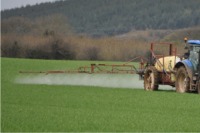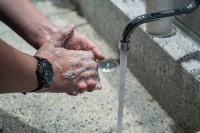
Pesticides have been listed by the Irish EPA (Environmental Protection Agency) as potentially dangerous pollutants that may pose a significant risk to the water environment throughout the Republic of Ireland. Although pesticides and herbicides are a very important tool used by farmers in modern agriculture, they also pose a threat to human and animal health due to off-site migration and their detrimental effects on surface water and groundwater quality.
Furthermore, the introduction of new products using new formulas or new ingredients in the manufacture of pesticides could result in diffuse inputs of new pollutants into the environment and the resultant environmental consequences are barely understood. Computed data shows that MCPA, Glyphosate, Chlorothalonil, Mecoprop-P, Chlormequat and Mancozeb are the six most widely used pesticides in agriculture in the Republic of Ireland. However, the levels of usage vary by county.
In a report published by Centre for Water Resources Research, School of Civil, Structural and Environmental Engineering, University College Dublin, the total amount of MCPA pesticide usage is one of the highest in the country, according to the Centre for Water Resources Research.*
At Uisce 4 U, we are based in the heart of East Limerick in Ballyneety and are familiar with the condition of rivers and streams in Co Limerick. It is well known that many of the rivers and streams in the county are dead and do not support any fish life. Farming methods used throughout the county are the most likely reason the rivers are so badly polluted. In addition to herbicides and pesticides, liquid slurry from intensive dairy farms is particularly hazardous to rivers and streams when it runs off the land or leaches into underground springs.
Animal waste from chickens, cows and pigs in confined conditions includes a number of potentially harmful pollutants including nitrogen, phosphorus, antibiotics, pathogens and hormones. From anecdotal evidence and also from the results of tests carried out on water samples from private wells in Co Limerick, we know that many private water wells are contaminated.
For this reason alone, we recommend that all private water wells especially those situated near intensive dairy farms should be inspected and tested for potentially harmful pollutants and pathogens. If in doubt, we recommend that homes using water from a private well should have a water filter system installed. An effective home water filtration system is a great way to protect your home drinking water from water borne contamination.
(*) Centre for Water Resources Research, School of Civil, Structural and Environmental Engineering, University College Dublin, Newstead, Belfield, Dublin 4, Ireland

